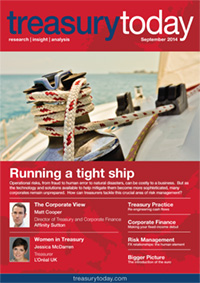Beginning of the end of CNAV funds
After much prevaricating and political posturing, and with new commissioners making the decisions, the Securities and Exchange Commission (SEC) in the US has adopted new rules for regulating money market funds (MMFs) in a 3-2 vote.
Institutional prime MMFs in the US (including institutional municipal MMFs) will be required to maintain a floating net asset value (FNAV, also often referred to as variable net asset value, or VNAV) for sales and redemptions based on the current market value of the securities in their portfolios rounded to the fourth decimal place.
The requirement would result in the daily share prices of these MMFs fluctuating with changes in the market-based value of the funds’ investments. The point is that the funds will no longer be allowed to use the special pricing and valuation conventions that currently permit them to maintain a constant share price of $1.00. Effectively this moves the funds from penny, or 1%, rounding, which allows minor fluctuations to be hidden to basis point, 1/100th of 1%, rounding.
Fund managers had hoped they would be able to continue to provide constant net asset value (CNAV) funds, providing there was a provision for liquidity fees and the funds were able to impose redemption gates (in other words, the ability to temporarily halt withdrawals) at times of stress. But the SEC has chosen to adopt these requirements in addition to, not instead of, the new VNAV rules outlined above.
So, consultation and debate are over. The new SEC rules are here. The rules have been adopted and will take effect after a two-year transition period.
Legislation being considered in Europe has been pushed back by the recent elections to the European Parliament. But the odds are now heavily stacked in favour of similar legislation being adopted in Europe. Expect to hear lots of talk about level playing fields and congruent regulation.
Wait and see
When polled, corporate treasurers say they like CNAV funds and will not use VNAV funds, but alternatives will be limited. Before dismissing the VNAV option, the wiser treasurer will investigate and understand the impact of the new legislation.
Corporates investing in the European-based funds can wait and see what the new EU economic and monetary affairs committee decides whilst keeping an eye on the bigger picture. Particularly important is the effect that the new Basel III rules will have on banks’ appetite for short-term deposits.
Any new money fund legislation must be accompanied by realistic rules on tax and accounting treatment of VNAV funds. This is already happening in the US, with the Internal Revenue Service putting in place simplified tax accounting arrangements as part of the SEC’s reforms.
Providing this happens as new legislation is adopted in Europe, corporates will find VNAV funds are an attractive short-term investment. They will educate their treasury committees and amend their treasury policies accordingly.
Our bet is that the MMF industry we know today will survive and may well, over time, see higher volumes than today. This may the beginning of the end of CNAV funds but it is also the beginning of VNAV funds becoming an investment in which corporates should and will invest.


